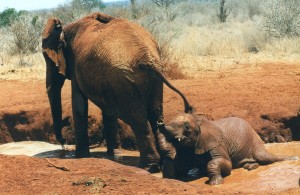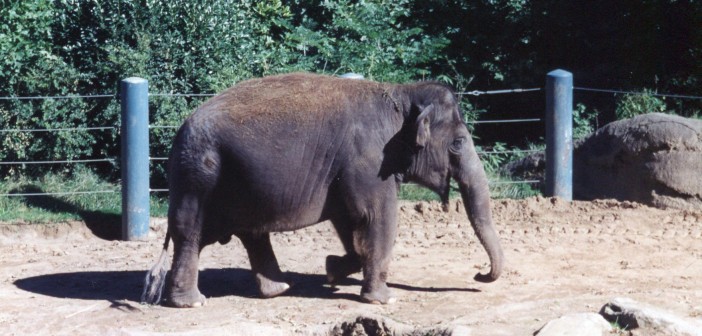(Featured image: Chai at Woodland Park Zoo in Seattle. Photo credit Kim Bartlett – Animal People, Inc.)
On the morning of January 30th, 2016, only eight months after being transferred from Seattle’s Woodland Park Zoo, Asian elephant Chai was found dead in her enclosure at the Oklahoma City Zoo. Her death comes as a tragedy to many, including the many activists in Seattle who fought tirelessly to have her retired to a sanctuary.
Chai was born in Thailand in 1979, and given to Seattle’s Woodland Park Zoo as a gift from Thai Airways and Bangkok’s Dusit Zoo at the age of one. In 2001, Chai gave birth to baby Hansa. Only 6 years later, Hansa died from the herpes virus. Elephants are highly intelligent and social animals, and strong inter-generational family bonds are a cornerstone of their social lives. Among the many injustices Chai suffered during her life in captivity, the deprivation of lasting relationships with either her mother or daughter was likely among the most traumatic. Chai was known to spend large amount of her time at Woodland Park Zoo engaging in stereotypic behaviors such as bobbing, swaying, and pacing. These behaviors are known to be indicative of boredom, stress, and few opportunities to express species-typical behaviors.
The fight to retire Chai to a sanctuary, along with Bamboo, her only remaining fellow elephant at Woodland Park Zoo, raged up until the very day they were transferred to Oklahoma City Zoo, in May 2016. Led by the organization Friends of the Woodland Park Zoo Elephants, activists in Seattle protested the inadequate conditions at Woodland Park Zoo, citing the lack of space, chronic health conditions, failed and invasive breeding program, and other traumas the elephants were forced to withstand. For example, under the Woodland Park Zoo breeding program, Chai in particular had to undergo 112 instances of artificial insemination and experienced several miscarriages. Additionally, both she and Bamboo suffered from chronic foot conditions and arthritis, both common ailments among elephants housed in zoos. Indeed, many health issues are more common and more fatal among zoo-housed elephants than those who are free-ranging, and this health disparity leads to a much lower expected lifespan in captivity. In a 2008 article in the journal Science, researchers found that captive-born female Asian elephants living in zoos had a median lifespan of only 19 years, compared to a median lifespan of about 42 years in the wild.

African elephants enjoying a mud bath at David Sheldrick Wildlife Trust’s release facility, Kenya (photo credit: Kim Bartlett – Animal People, Inc.)
Because of these issues, Friends of the Woodland Park Zoo Elephants waged a nine-year campaign that included in-person protests, lawsuits, USDA complaints, and bulk calls and letters to the mayor and city council members. Jane Goodall and Bob Barker both wrote letters of support, Goodall urging that “Bamboo and Chai deserve to live out their lives [in a sanctuary].” Additionally, in 2012 The Seattle Times published an extensive and highly critical examination of elephants in zoos, including at Woodland Park Zoo specifically, in which they stated that “the decades-long effort by zoos to preserve and protect elephants is failing, exacerbated by substandard conditions and denial of mounting scientific evidence that most elephants do not thrive in captivity.” Unfortunately, throughout this campaign Woodland Park Zoo did not appear to consider the proposal to retire the elephants to a PAWS sanctuary in California. Instead they remained defensive until the very end, even devoting a page on their website to refuting the activists’ claims, calling them “alarming” and “inflammatory.”
Instead of sending Bamboo and Chai to a sanctuary, Woodland Park Zoo decided to send them with very little warning to Oklahoma City Zoo. In an email sent to zoo members about the decision to close their elephant exhibit, Woodland Park Zoo made no mention of the ongoing controversy within Seattle regarding the elephants, or their history of premature elephant deaths and health problems. Instead, they cited the reasons for the move as largely based on the zoo’s inability to find more elephants to add to their dwindling group. As protests and lawsuits regarding this decision continued, Chai and Bamboo were sent on a long and arduous journey to Oklahoma City, stopping at San Diego Zoo on the way due to inclement weather.
Chai and Bamboo arrived in Oklahoma City in May 2015. From their arrival until the night before Chai’s death, they were reported to be doing well and behaving normally. Preliminary results of Chai’s autopsy have determined that her cause of death was not the herpes virus, a common cause of death among zoo-housed elephants, but further tests are needed to determine how she did die. Throughout this, both zoos involved have made statements about their own sadness and surprise regarding Chai’s death. While those individuals working within the zoos very likely made choices that they believed to be serving the elephants’ best interests, and did so from a place that they believed to be rooted in care for animals, their perspective was myopic and lacked an understanding of one of the most important factors in this debate. And that is an elephant’s inherent value as a sentient being, unrelated to any use assigned to them by humans.





